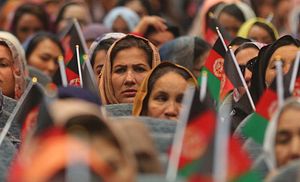Afghanistan’s first female ambassador to the United Nations has started a U.N. group to protect the rights Afghan women gained after the Taliban was ousted from power 18 years ago, amid fresh efforts to rekindle talks with the fundamentalist group to end the country’s long-running war.
Adela Raz told reporters Tuesday she is “not totally certain” women’s rights will be included in future talks with the Taliban, which is a key reason she spearheaded formation of the Group of Friends of Women in Afghanistan.
The Taliban imposed a harsh form of Islamic law when it ruled Afghanistan from 1996 to 2001, banning women from education and jobs and subjecting them to stoning as a death sentence. The Taliban sheltered al-Qaida and its leader Osama bin Laden before the 9/11 attack on the United States and was ousted from power in 2001 by a U.S.-led invasion.
Raz said about 20 countries with female ambassadors and deputy ambassadors, including the U.S., France, Qatar, Turkey and the United Arab Emirates, have already joined the Group of Friends. The group, which is co-chaired by Raz and British Ambassador Karen Pierce, also has support from the African Union, Indonesia’s foreign minister and U.N. Deputy Secretary-General Amina Mohammed, the Afghan ambassador said.
While the initial members are women, Raz said, it is “definitely open” to male ambassadors and deputy ambassadors as well.
Raz said the group’s members are “champions of women’s rights” and want to make sure that Afghan women are recognized as partners and leaders and that they have seats at the table where peace is being negotiated.
About two-thirds of Afghanistan’s population is 25 or younger, and Raz said that “the youth in Afghanistan are pro-democracy, pro-democratic values, pro-rights of women.” She said women’s rights and minorities’ rights must be part of any agreement for it to be accepted, implemented and durable.
Pierce, a former British ambassador to Afghanistan, said the Group of Friends will not be “just a talking shop.”
She said its members want especially “to be a champion of involving women in the Afghan peace process … not so that they have to be invited, but so that they are an integral part from the word `go’.”
Mohammed, the U.N. deputy secretary-general, said at the group’s launch on Monday that Afghan women “are now contributing to the country’s development at all levels: from senior roles in government, as provincial governors and local officials, in the defense and security forces, in the civil service, in Parliament where more than one-third of members are women.”
“We are sending a message: women’s inclusion is critical to sustainable peace and development in Afghanistan,” she said.
Raz and Pierce spoke to reporters on a day that the Taliban freed American and Australian hostages following the Afghan government’s release of three Taliban prisoners — a swap the insurgent group said could help restart peace talks.
“We hope that this will be an important gesture from the government that will be taken — that we’re really serious about peace negotiations,” Raz said. “And we hope to see the promises that the Taliban have made in order that they will reduce violence or have a cease-fire in order to show their indication that they are serious and committed to peace and negotiations.”
By Edith M. Lederer for the Associated Press.

































